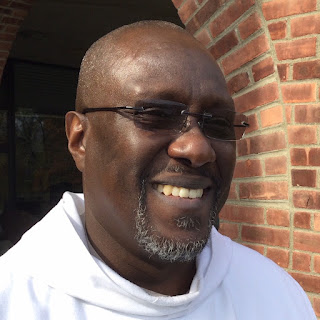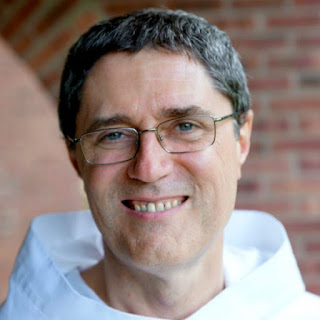Holy Cross Monastery, West Park, NY
Br. Ephrem Arcement
Easter 7 C - May 29, 2022
God is power! Power of a specific kind but power nonetheless…explosive, extravagant, creative power. Open up your Bible to nearly any page and you will read about a God creating the heavens and the earth, turning rivers into blood and parting seas, providing manna from heaven and water from a rock. You will read about miracles of healing and miracles of divine intervention. Or what about the Incarnation, Resurrection, and Ascension of our Lord? What are these events without power? Or the Easter story we hear today about the Apostles casting out a spirit of divination from a slave girl or the power of prayer and worship to open prison doors and break shackles? And then there is the power of God on showcase in the book of Revelation where the Risen Lord is about to come from heaven to save the saints and destroy evil once for all.
And yet the pages of the Bible are also filled with another kind of power…the power to tempt and lead astray, the power of a lie to wreak devastating consequences, the power of shame and guilt, the power to plunder and kill, the power of sickness and death.
No wonder some of our favorite stories are those about the clashing of powers…the power of good versus the power of evil. The Gospel of Jesus Christ is, in fact, the good news that God is more powerful than Satan, that life is more powerful than death. So, it is hard to deny that at the heart of life and faith is this reality of power. It is the force of life. It is the DNA of the beating human heart.
The inestimable gift of God that we have received in Christ is that in Christ we encounter power completely and totally sanctified and pure, never turned in on itself, always overflowing for good. In Christ, power is purely and simply love at every turn. Never control, never manipulation.
He reveals it in his healing the sick and liberating those bound by the devil; in his acts of reconciling and bringing into community those who are marginalized; in his heroic ability to endure the injustices of a world who misunderstands and rejects him and in his courage of denying himself his own right to live.
As we approach the liturgical end of celebrating the saving events of Christ in his Paschal Mystery, it is an opportune time for us to reflect on the meaning of it all and widen the scope of our vision. What was the purpose of Christ's life but to unleash upon the world a power to transform it and make it what it was always intended to be? In Christ we encounter a God who has not been deaf to those who have cried out shackled in the power of evil and One who has indeed heard and decisively answered. The answer was like nothing anyone expected but far more than anyone could have hoped. We have been given a power that liberates and transforms. Its name is Love, the only force to conquer evil and turn hearts of stone into hearts of flesh allowing them to act in the very same power of Christ himself…healing, reconciling, and bringing life to those who are dead.
Today we hear our Lord pray that we all may be one, even completely one, just as he and the Father are one…and that we may dwell in God and God may dwell in us. This grand, mystical vision boggles the mind and humbles the heart. Yet, this is precisely God’s gift to us and our destiny. The point of the Christian life is to learn how to harness this power for divine intimacy and live in its fullness. And Christ didn’t pray that we would come to experience this oneness once we get to heaven. No, he prayed that we would come to experience this oneness even now, in this life…a oneness with God that empowers us to live at one with each other.
And, most importantly, as we widen the scope, we see that at the very heart of the Paschal journey stands a bloody cross…the sanctifying, transforming instrument that takes power turned in on itself and transforms it into something divine…the power to bear the hatred of this world and to bury it in the sacrifice of one’s life.
Meekness has been defined as power under control. It comes from the Greek which referred to a wild stallion who undergoes months of training to bring its unruly strength into submission so that it can be directed to use that strength in ways that would be most effective in battle. For me, this kind of meekness is the glory of Christian power and has become the goal of my own Christian life.
When I see the gross divisions in our world, between nations, between races, even between churches…when I see violence perpetrated against fellow human beings or against the natural world in which we live…when I see how one human being can control and manipulate a nation and unleash devastating terror on thousands…and when I think of the Christian response that can finally save us from such powerful forces of evil…I think of Christ, the meek and humble Lamb of God who unleashed on the world a greater power still and am compelled to live more fully into what has already been given, the victory already won.
And so we pray…Lord of Life, who has created all that is by your powerful, life-giving Word, pour out upon us once again the power of your Spirit as we anticipate the celebration of your divine Love lavishly given at Pentecost. Take our broken, stony hearts and imbue them with life, recreating them in your divine image. Heal us, renew us, and inspire us to always act in the conquering power of your mercy and forgiveness and so reveal to a world fractured to breaking point the way to reconciliation and peace…for you are the Light that has cast out the darkness, the Lamb that has taken away the sin of the world. Come, Lord Jesus! Holy Spirit, come! Amen.





